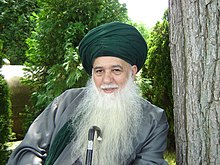As-Sunnah Foundation of America
This article may be in need of reorganization to comply with Wikipedia's layout guidelines. (July 2023) |
 Sheikh Hisham Kabbani founder of As-Sunnah foundation of America | |
| Founder | |
|---|---|
| Hisham Kabbani | |
| Religions | |
| Islam | |
| Scriptures | |
| Quran, Hadith and Sunnat Jurisprudence: Hanafi |
As-Sunnah Foundation of America[1] (ASFA)[2] is an educational organization that works for the unity of the Islamic faith in the United States, founded and chaired by Hisham Kabbani. Founded in 1997, together with the Islamic Supreme Council of America (ISCA), the ASFA has close connections to Kabbani's Naqshbandi Haqqani Sufi Order.[3] The ASFA is said be a main organization of Nakshbandi Sufi order in America.[4]
Kabbani's sunnah.org website is mentioned in the article "Sufi Charisma on the Internet" by Garbi Schmidt (2004).[5]
Affiliation
As-Sunnah foundation of America is affiliated to Islamic Supreme Council of America(ICSA).[6]
Aims
As-Sunnah Foundation has its offices in ![]() Indonesia,
Indonesia, ![]() Pakistan,
Pakistan, ![]() England,
England, ![]() Germany and
Germany and ![]() Malaysia and its headquarters in
Malaysia and its headquarters in ![]() United States.[7]
United States.[7]
The website of this organization aims to provide non-chargeable Islamic education, information on various Islamic events, publications, Q&A, prayer resources and fatwa.[8]
Publications
ASFA has published a number of traditionalist books, primarily authored by founder, Shaykh Kabbani, or translated from traditional sources by protégé, Dr. Gibril Fouad Haddad. Published titles include:
- Kabbani, Shaykh Muhammad Hisham, Salafi Movement Unveiled, ASFA, 2000.
- Kabbani, Shaykh Muhammad Hisham, Encyclopedia of Islamic Doctrine, ISBN 1-871031-48-6, ASFA, 1998.[9]
- Jamal Effendi al-`Iraqi al-Zahawi, The Doctrine of Ahl as-Sunna Versus the "Salafi" Movement, translated with notes by Shaykh Muhammad Hisham Kabbani, ASFA, 1996. [dubious – discuss]
- Imam al-Bayhaqi, Allah's Names and Attributes (Al-Asma' wa al-Sifat), translated by Dr. Gibril Fouad Haddad, ASFA, 1998.
- al-Maliki, As-Sayyid Muhammad ibn Alawi, The Prophets in Barzakh; The Hadith of Isra' and Mi'raj, The Immense Merits of Al-Sham; The Vision of Allah, translated by Dr. Gibril Fouad Haddad, ASFA, 1998.
- Imam 'Izz ibn 'Abd al-Salam, Beliefs of the People of Islam (Aqa'id Ahl al-Islam), translated by Dr. Gibril Fouad Haddad, ASFA, 1998.
- Ibn Khafif, Correct Islamic Doctrine (Al-'Aqida al-Sahiha), Islamic Doctrine (Al-'Aqida Ahl al-Islam), translated by Dr. Gibril Fouad Haddad, ASFA, 1998.
- Kabbani, Shaykh Muhammad Hisham, Islamic Beliefs and Doctrine According to Ahl as-Sunna - A Repudiation of "Salafi" Innovations, ASFA, 1996.[dubious – discuss]
- Kabbani, Shaykh Muhammad Hisham, Innovation and True Belief: the Celebration of Mawlid According to the Qur'an and Sunna and the Scholars of Islam, ASFA, 1995.
- al-Mani, Dr. Isa Humayri, MAWLID Its Permissibility, Its Necessity, Its Reality: Fatwa of Dubai Regarding Celebration of Mawlid an-Nabi, ASFA, 1997.
- Al-`allama Al-Shaykh Abdul Rahman Al-Sufuri Al-Shafi`i, Nuzhat Al-Majalis Wa Muntakhab Al-Nafa'is - Talks about Sincerity, Doctrine, Remembrance of God, and on the Night of Power, translated by Dr. Gibril Fouad Haddad, ASFA 1998.
See also
- Naqshbandi Haqqani Sufi Order of America
- Islamic Supreme Council of America
- Sufi Muslim Council
- As Sunnah Foundation
 Bangladesh
Bangladesh
References
- ^ Tharoor, Ishaan (15 November 2014). "Muslims discovered America before Columbus, claims Turkey's Erdogan". Washington Post. Archived from the original on 14 January 2021. Retrieved 21 July 2020.
- ^ The Minaret: The Islamic Magazine. Islamic Center of Southern California. 1997.
- ^ Encyclopedia of Islam in the United States, Jocelyne Cesari (ed.), Encyclopedia of Islam in the United States, vol. 1, Greenwood Press, 2007, ISBN 978-0-313-33626-3, p. 457.
- ^ Curtis, Edward E. (2010). Encyclopedia of Muslim-American History. Infobase Publishing. ISBN 978-1-4381-3040-8.
- ^ D. Westerlund (ed.), Sufism in Europe and North America, Sufism in Europe and North America, London–New York: Routledge Curzon, 2004, p. 123. "Kabbani gives several examples of what he sees as the characteristics of the opposition between radical Islam and traditional Islam. Traditional Islam is described as peace-loving, moderate, a basis for unity and based on a democratic idea of the umma. Radical Islam, on the other hand, is violent, dictatorial, a source of fragmentation and destructive for the umma. Traditional Islam is apolitical and tolerant as long as the faithful are allowed to practise their religious duties, while radical Islam is engaged in politics solely to gain power and authority. Traditional Islam is characterised by knowledge and linked to a lineage of Muslim scholars who have a profound knowledge about the religious message, while radical Islam is characterised by a lack of knowledge, dilettantism and wrongful guidance."
- ^ Al-Bayhaqi, Imam (12 December 1999). Allah's Names and Attributes. ISCA. ISBN 978-1-930409-03-3.
- ^ Storey, John Woodrow; Utter, Glenn H. (2002). Religion and Politics: A Reference Handbook. ABC-CLIO. ISBN 978-1-57607-218-9.
- ^ "Islam-Islam and Middle East". www.ou.edu. Retrieved 2020-07-21.
- ^ Kabbani, Muhammad Hisham (1998). Encyclopedia of Islamic Doctrine: Beliefs. As-Sunna Foundation of America. ISBN 978-1-871031-48-5.
- Sufism in Europe and North America, Sufism in Europe and North America Edited by DAVID WESTERLUND (London–New York: Routledge Curzon, 2004), p. 123.
External links
This article may be in need of reorganization to comply with Wikipedia's layout guidelines. (July 2023) |
